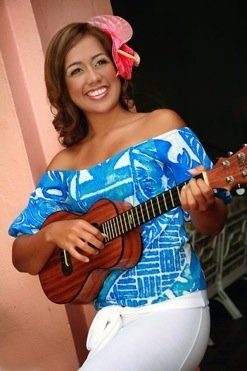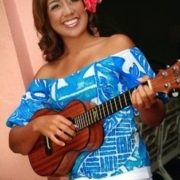Falsetto Festival Hits High Note

“Now that was a real folk festival!” I said to my husband Michael as we strolled out of the Redondo Beach Performing Arts Center just past six o’clock on Sunday, July 13, 2008. We had just spent four hours listening to Hawaiian falsetto singers, some imported from the islands, some local. The Aloha Falsetto Festival proved that this special art of singing by both men and women is both alive and, judging from the enthusiastic, near-capacity crowd, much appreciated.
The program progressed from the locals and lesser-knowns to the headliners, ending with the supremely gifted Raietea Helm. At 23, the a two- time Grammy nominee and Na Hoku Hano Hano (Hawaiian Grammy) award-winner produced strong, crystal-clear high notes and goose bump-producing musical nuances as she interpreted songs by Lena Machado, Helen Deshe Beamer, Johnny Almeida, and other composers in the pantheon of 20th century Hawaiian music. Her brilliance and stamina brought to mind Genoa Keawe, recently-departed at age 89, and all the more when Raietea ended her set with Aunty Genoa’s signature song Alika”. That is the number that showcased Aunty’s ability to hold a high note for as long as two minutes. Raietea did not hold the note quite that long, but she still merits Aunty Genoa’s musical mantle. Guitarist Jeff Peterson from Maui provided expert back-up, notably when Raietea took a brief holiday from falsetto to do more than justice to the jazz standard At Last.
Close to Riaetea Helm in star status and preceding her on the program was Hoku Zuttermeister, who has 2008 Na Hoku Hano Hano awards under his belt. His powerful male falsetto retains a mellow, effortless quality and his banter with the bassist created relaxed atmosphere on stage. Presenting polished interpretations of familiar falsetto vehicles, Zuttermeister, too, showed the influence of Genoa Keawe. In an interview prior to the Festival, he reflected, “Aunty had one of the greatest voices of our time, but when you felt her love and her spirit, her music took on a whole new meaning,” he says. “I know she’s still singing and looking down to continue to bless us with her love.”
Another memorable performer was Gary Haleamau, apparently a falsetto favorite over a dozen years ago, who took a long sabbatical from the concert circuit to devote himself to evangelical work until his current return. His strong, rougher-hewn falsetto did the genre credit and he ended with a hymn that touched the heart.
While the imported talent inspired cries of “Hana ho!” (Hawaiian for “encore!”), one of the local performers drew equal enthusiasm. Oahu-born Geri Brigoli, who has sung with Uncle Joe Keawe, Uncle Ilia Kamae, Genoa Keawe, and even Elvis Presley, now resides in Southern California and performs weekly at Bob’s, a well-established, down-home Hawaiian restaurant in the Gardena area. Aunty Geri’s sweet voice lilted in the air, and although not delivering the power and nuance of Raietea’s, interpreted Hawaiian standards with tender sincerity. During one of Raietea’s numbers, she danced hula to huge acclaim. One sensed the audience cheering her on, proud of their local Aunty’s talent and spunk.
Several other singers performed falsetto numbers with-I must be frank-uneven results. They were not in a class with those mentioned above. One would be more comfortable hearing them on a country porch or in a backyard kani kapile (jam session). Similarly, many of the vocal performances featured hula dancers from local halau that danced with heart, but again, with varying degrees of professionalism.
But that was okay. This was a damn fine folk festival.
What made it so? Apart from the performers, it was the people who attended. Many were Hawaiian-born, of Hawaiian extraction, or somehow involved in Hawaiian music. You could sense the warmth of community in the auditorium, in the lobby, even on the sidewalk as you entered the Redondo Performing Arts Center. Hugs and slaps on the back abounded as people not only from the Asian-Pacific communities in nearby Gardena, Lomita, and Torrance but also from Orange County greeted one another. Kumu hula (hula teachers), dancers from hula halau, and musicians were out in force. Men in Hawaiian shirts and women with flower leis and floral hair pieces proclaimed their Hawaiian identity. Vendor booths showcased still more leis and Hawaiian shirts, jewelry, and Hawaiiana books. During the two intermissions, you could buy down-home Hawaiian food items like spam musubi and huge, Hawaiian-style servings of kahlua pork with sides of rice and macaroni salad courtesy of Bob’s restaurant. It was a coming home of sorts.
Although small compared to the upcoming Ho’olaulea taking place in Alondra Park in Lawndale the weekend of July 19-20 and the E Hula Mau hula competition at the Long Beach Convention Center on Labor Day Weekend, this was a Hawaiian festival with heart. It lived up to its billing as the Aloha Falsetto Festival, succeeding because it presented sufficient top talent and produced aloha to spare.
Audrey Coleman is a writer, educator, hula student and passionate explorer of world music and culture.













